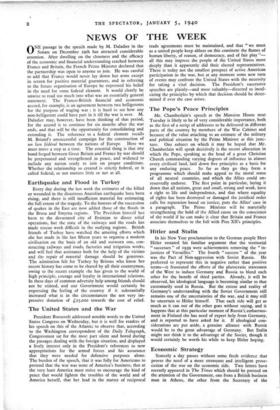The United States and the War
President Roosevelt addressed notable words to the United States Congress on Wednesday, but it is well for readers of his speech on this of the Atlantic to observe that, according to the Washington correspondent of the Daily Telegraph, Congressmen sat for the most part silent and bored during the passages dealing with the foreign situation, and displayed a lively interest only in the President's references to new appropriations for the armed forces and his assurance that they were needed for defensive purposes alone. The burden of the speech, that it was folly for Americans to pretend that the war was none of America's business, that at the very least America must strive to encourage the kind of peace that would lighten the troubles of the world and of America herself, that her lead in the matter of reciprocal trade agreements must be maintained, and that " we must as a united people keep ablaze on this continent the flames of human liberty, of reason, of democracy, and of fair play "- all this may impress the people of the United States more deeply than it apparently did their elected representatives. There is today not the smallest prospect of active American participation in the war, but at any moment some new turn of events may confront the United States with the necessity for taking a vital decision. The President's successive speeches are plainly—and most valuably—directed to incul- cating the principles by which that decision should be deter- mined if ever the case arises.


































 Previous page
Previous page